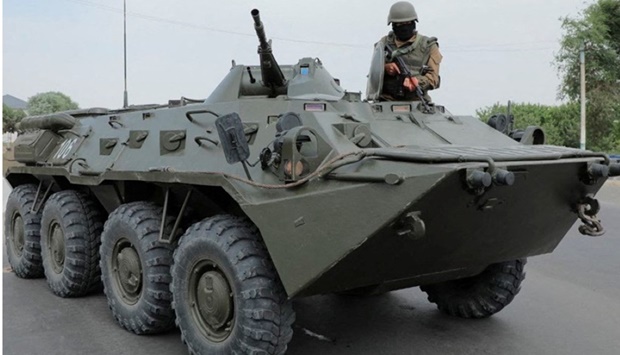Eighteen people were killed and 243 wounded during unrest in Uzbekistan's autonomous province of Karakalpakstan last week, Uzbek authorities said on Monday, the worst bout of violence in the Central Asian nation in 17 years.
Security forces detained 516 people during the protests which broke out over plans to curtail Karakalpakstan's autonomy but have now released many of them, the national guard press office told a briefing.
On Saturday, President Shavkat Mirziyoyev dropped plans to amend articles of the constitution concerning Karakalpakstan's sovereignty and its right to secede. He also declared a month-long state of emergency in the northwestern province.
Official reports said protesters had marched through the provincial capital of Nukus last Friday and tried to seize local government buildings, triggering the deadliest unrest in almost two decades in the Central Asian nation of 34 million.
According to the prosecutor general's office, 18 people died "from grave wounds" sustained during the clashes.
Two exiled opposition politicians in contact with people on the ground told Reuters they believed the real figure was much higher. It was not possible to independently establish the death toll.
Karakalpakstan, situated on the shores of the Aral Sea that has for decades been a site of environmental disaster, is home to Karakalpaks, an ethnic minority group whose language, although also Turkic, is distinct from Uzbek.
"Karakalpaks are not Uzbeks... They have their own traditions, culture and law,” Aman Sagidullayev, the Norway-based leader of the Alga Karakalpakstan party which favours independence for Karakalpakstan, told Reuters, accusing the government of waging a "punitive operation”.
A group of opposition politicians and activists who call themselves the government of Karakalpakstan in exile published an appeal to Mirziyoyev.
In it, they called for the release of arrested demonstrators, the dissolution of the Karakalpak government and holding of new elections, and a review of the actions of law enforcement agencies including "the unjustified and disproportionate use of force that led to human victims, torture and arbitrary detention".
They complained about discrimination against their language and the "silencing and distortion" of the region's history.
Russia, with which ex-Soviet Uzbekistan has close ties, said the matter was Uzbekistan's domestic affair, while the European Union called for "an open and independent investigation into the violent events in Karakalpakstan".
Mirziyoyev's office said separately he discussed the matter with EU Council President Charles Michel and said the unrest had been incited by "criminal elements".
An exiled Uzbek opposition politician, Pulat Ahunov, told Reuters that the curfew imposed for the duration of the state of emergency and tight security seemed to have stabilised the situation but there was still a risk of ethnic clashes.
An estimated 700,000 Karakalpaks live in Uzbekistan, most of them in the autonomous republic. Geographic and linguistic proximity has led many to seek work and sometimes relocate to neighbouring Kazakhstan.
Some observers believe Tashkent's miscalculated attempt to curtail Karakalpakstan's autonomy - Mirziyoyev himself has criticised local MPs for not telling him about public opposition to it - was likely a pre-emptive move against potential separatism against the background of the Ukrainian conflict.
In 2005, Uzbek security forces crushed armed protests in the city of Andizhan, with 173 people killed in the clashes, according to official reports. The government blamed the crisis in Andizhan - located in the opposite, eastern part of Uzbekistan - on Islamist extremists at the time.

An Uzbek service member guards a street in Nukus, capital of the northwestern Karakalpakstan region, Uzbekistan on July 3. KUN.UZ/Handout via REUTERS
